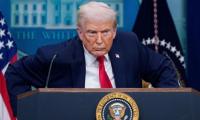World debates on public disclosure of donations pocketed by political parties
LAHORE: At what could be dubbed a defining juncture of Pakistan’s electoral history, almost all mainstream national political parties are facing charges of receiving prohibited funds from foreign sources and accusing each other vehemently of quietly bagging disguised donations, though fiery debates are being held globally for the last few years regarding public disclosure of these massive sums collected by public leaders in the name of political financing.
So, it is not just Pakistan's issue and questions are being asked from political stake-holders everywhere around the globe by institutes and finance watchdogs of high credibility and repute.
For example, the International Foundation for Electoral Systems, a Washington DC-based non-profit organization, has viewed: "In democracies all the over the world, the role of money in politics is a controversial and often polarizing issue. While political financing is a necessary component of any election, regulating, such financing can be a difficult balancing act and potentially impinge upon citizens’ ability to have a voice. Public financing is both pervasive, with most countries in the world providing some type of public funding, and varied, as democracies and authoritarian regimes regulate political finance laws and implement public funding in a host of different ways."
During the course of its 2019 Oslo (Norway) Conference on the subject, the Vienna-based United Nations Office on Drugs and Crime (UNODC) had viewed: “Donations should be transparent to prevent any risk of influencing the political decision-making process. Splitting of donations and channeling donations through a great number of donors is a traditional way to circumnavigate rules on donations transparency. For four years in Italy after the removal of public funding in 2013, we noted a decrease of 61 % in the income of political parties. But there was the loophole concerning funding from foreign sources which was permitted.”
It observed: “Things changed this year. However, such a form of foreign income when it is legal, is not liable to investigation. But the prohibition of foreign funding faces several obstacles. When a donation is made through a national subsidiary of a foreign parenting firm, it is not easy to assert that this subsidiary is completely independent from the foreign parenting firm. Under Indian law, foreign company includes an Indian subsidiary of a foreign company. Prohibition should not ban just overseas donations but foreign spending too. Indeed, what would the impact of a ban on foreign donation be, if at the same time foreign electoral campaign expenditure is permitted? We can endorse the position of the British Electoral Commission which advocates for a ban of foreign electoral expenditure regarding spending on digital electoral campaigns.”
The United Nations Office on Drugs and Crime had asserted: “Loans are an important source of income for political parties or candidates in different countries such as in France, Poland, Spain for instance. But loans must not be hidden, disguised donations if their rates of interest are under market conditions or if they may be cancelled. In Germany the amount of the loans but neither the name of the lender nor its location has to be disclosed in the annual party financial statements. Good practices may remedy this risk. Some steps concerning loans may be considered as a progress. Three issues have now been regulated in France since 2017: the length of the loan, the identity of the lender and the transparency of the loan. Spanish political parties are liable to an obligation of information on the amount, the rate of interest and the repayment. Debt cancellation which would be a donation is prohibited. The funding of electoral campaigns on one’s own, personal funds of candidates is very questionable also. In Germany they use the word “dowry” to designate the personal funds of the direct candidates to parliamentary elections.”
It maintained: “Cash donations are a blind spot in the legal framework of political finance. Anonymous donations are often prohibited but cash donations are not always banned. Cash donations should not be conflated with anonymous donations because cash donations may be made by an identified donor who expects benefits in return for his donation. Good practice in that field is provided by the United Kingdom. If the donation comes from an unidentified source- an anonymous cash donation-, it must be given back to the person who transferred the donation. Prohibition of these donations is usually considered to prevent undue influence of business on politics.”
A few years ago, the London-based Overseas Development Institute had carried an eyebrow-raising research report on its website, according to which, in numerous fledgling democracies, funding can also be provided through foreign aid.
This 60-yerar old independent think tank on international development and humanitarian issues had viewed: "International donors provide financial help to political parties in developing countries as a means to promote democracy and good governance, or, in some cases, to support preferred political parties. Support can be purely financial or otherwise. Frequently, support is provided in the form of capacity development activities, including the development of party manifestos, party constitutions, and campaigning skills.”
-
 Meghan Markle Set To Take Big Decision On Returning To UK For Invictus Games
Meghan Markle Set To Take Big Decision On Returning To UK For Invictus Games -
 Prince Harry To Leave Britain One Day Earlier Than Expected For THIS Reason
Prince Harry To Leave Britain One Day Earlier Than Expected For THIS Reason -
 The Way You Consume Sugar Could Be Affecting Your Health
The Way You Consume Sugar Could Be Affecting Your Health -
 Brooklyn Beckham Gets Backing From Vanessa Marcil Amid Feud With Parents
Brooklyn Beckham Gets Backing From Vanessa Marcil Amid Feud With Parents -
 OpenAI Uses AI To Detect Under 18 Users On ChatGPT
OpenAI Uses AI To Detect Under 18 Users On ChatGPT -
 Philippines To Lift Ban On Grok AI After Musk's Platform Commits To Fix Safety Concerns
Philippines To Lift Ban On Grok AI After Musk's Platform Commits To Fix Safety Concerns -
 Trump Vows ‘no Going Back’ On Greenland Ahead Of Davos Visit
Trump Vows ‘no Going Back’ On Greenland Ahead Of Davos Visit -
 Alexander Skarsgard Breaks Silence On Rumors He Is Bisexual
Alexander Skarsgard Breaks Silence On Rumors He Is Bisexual -
 King Charles Faces Rift With Prince William Over Prince Harry’s Invictus Games
King Charles Faces Rift With Prince William Over Prince Harry’s Invictus Games -
 Elon Musk’s Critique On ChatGPT Safety Draws Sharp Response From Sam Altman
Elon Musk’s Critique On ChatGPT Safety Draws Sharp Response From Sam Altman -
 Katherine Ryan Takes Aim At Brooklyn Beckham In Fierce Defense Of His Parents
Katherine Ryan Takes Aim At Brooklyn Beckham In Fierce Defense Of His Parents -
 How Timothy Busfield, Melissa Gilbert Really Feel After Release From Jail
How Timothy Busfield, Melissa Gilbert Really Feel After Release From Jail -
 OpenAI, Bill Gates Launch ‘Horizon 1000’ To Transform AI Healthcare In Africa
OpenAI, Bill Gates Launch ‘Horizon 1000’ To Transform AI Healthcare In Africa -
 Prince Harry Receives Praises For Exposing Dark Side Of British Tabloids
Prince Harry Receives Praises For Exposing Dark Side Of British Tabloids -
 Andrew Forces Beatrice, Eugenie To Lose $60 Million Safety Net Saved For Retirement
Andrew Forces Beatrice, Eugenie To Lose $60 Million Safety Net Saved For Retirement -
 Nvidia CEO Jensen Huang To Visit China To Push Re-entry Into AI Chip Market
Nvidia CEO Jensen Huang To Visit China To Push Re-entry Into AI Chip Market




